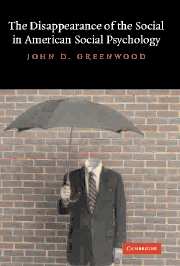Book contents
- Frontmatter
- Contents
- Preface
- Introduction: What Happened to the “Social” in Social Psychology?
- 1 The Lost World
- 2 Wundt and Völkerpsychologie
- 3 Durkheim and Social Facts
- 4 The Social and the Psychological
- 5 Social Psychology and the “Social Mind”
- 6 Individualism and the Social
- 7 Crowds, Publics, and Experimental Social Psychology
- 8 Crossroads
- 9 Crisis
- 10 The Rediscovery of the Social?
- References
- Index
Introduction: What Happened to the “Social” in Social Psychology?
Published online by Cambridge University Press: 18 December 2009
- Frontmatter
- Contents
- Preface
- Introduction: What Happened to the “Social” in Social Psychology?
- 1 The Lost World
- 2 Wundt and Völkerpsychologie
- 3 Durkheim and Social Facts
- 4 The Social and the Psychological
- 5 Social Psychology and the “Social Mind”
- 6 Individualism and the Social
- 7 Crowds, Publics, and Experimental Social Psychology
- 8 Crossroads
- 9 Crisis
- 10 The Rediscovery of the Social?
- References
- Index
Summary
In this work I document the historical abandonment of the distinctive conception of the social dimensions of cognition, emotion, and behavior, and of the discipline of social psychology itself, that was recognized in the early decades of twentieth century American social psychology. This conception was progressively neglected from the 1930s onward, to the extent that scarcely a trace of the original conception of the social remains in contemporary American “social” psychology. I also suggest some explanations, albeit partial and tentative, of this historical neglect and eventual abandonment.
On the face of it, this is a remarkable and surprising claim to make. American social psychology is a well-established discipline with an almost hundred-year history and a present professional membership in the thousands. However, the fact that a discipline calls itself social psychology does not guarantee the social nature of whatever is considered to be its subject matter. In this work, I argue that contemporary American social psychology has virtually abandoned the study of the social dimensions of psychological states and behavior.
Of course, whether one is inclined to accept this claim will largely depend upon one's conception of the social. Those who embrace a different conception of the social from the one advocated in this work might very well hold that American social psychology has never been more social than it is today. For better or worse, most contemporary American social psychologists do in fact embrace a different conception of the social.
- Type
- Chapter
- Information
- Publisher: Cambridge University PressPrint publication year: 2003



